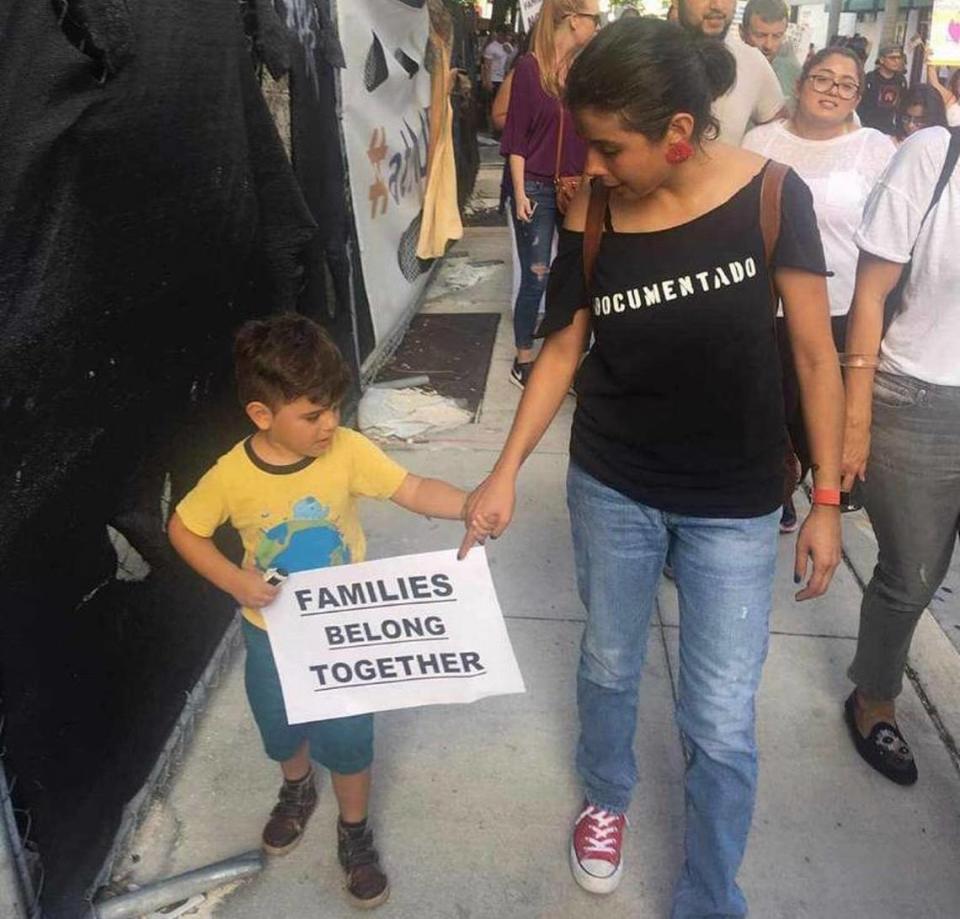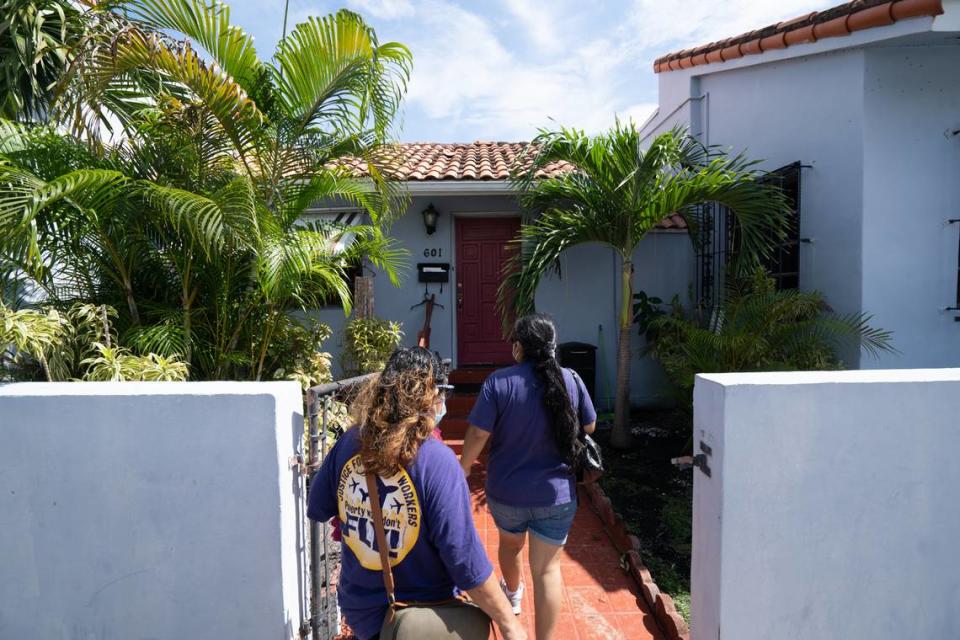‘Do they just not care?’ Miami immigrants troubled by surge of Latino support for Trump
- Oops!Something went wrong.Please try again later.
Unable to vote because of her immigration status, Maria Elena Hernandez, a Nicaraguan janitorial worker with temporary protected status (TPS), found other ways to engage with the 2020 election.
Along with fellow members of her union, a local chapter of Service Employees International, Hernandez spent the days leading up to Nov. 3 knocking on doors across Miami-Dade and talking to voters about Joe Biden, whom she considers to be more “in favor of workers and immigrants” than President Donald Trump. For years, Hernandez has also encouraged immigrant co-workers eligible for citizenship to complete the naturalization process, so that they can “defend our rights” with their vote.
On election night, as preliminary results suggested a possible path to the president’s reelection, Hernandez’s mind briefly went to the worst-case scenario, given the Trump administration’s commitment to ending the TPS program she depends on.
“I was a nervous wreck that night,” she said. “I could see myself getting deported back to my country.”
For Hernandez, and for many other non-voting Latino immigrants in South Florida who have felt targeted by Trump’s restrictionist immigration agenda, the election’s final results proved bittersweet.
While Biden ended up posting resounding electoral college and popular vote victories nationwide, Trump won the state of Florida, buoyed in part by a groundswell of Hispanic support. In Miami-Dade, a growing coalition of Cuban and non-Cuban Latino voters alike helped lift the president to the best margins a Republican candidate has scored in the state’s most populous county in 16 years.
Trump won nearly 55% of the vote across the county’s majority Hispanic districts. That’s forcing immigrants like Hernandez to reconcile their relief over Biden’s win with a dose of exasperation with their own community.
“It’s frustrating, seeing so many Latinos backing [Trump] and voting for him,” Hernandez said. “I keep asking myself, ‘Why do they vote for someone who is anti-immigrant? Someone who is racist? Someone who doesn’t like us? Why don’t they look at the harm he has caused?’ It’s just a very frustrating situation.”
Although she is a U.S. citizen, Mariana Martinez counts many undocumented immigrants and TPS holders among the ranks of her Salvadoran family members. Trump’s popularity with Miami-Dade’s Latinos isn’t something she was shocked by: in the lead-up to the election, she saw more Trump signs popping up in Cutler Bay, where she lives, and in Homestead, where her work as an immigrant rights advocate with the American Friends Service Committee often takes her. But lack of surprise doesn’t mean lack of disappointment.
“I guess it’s like, ‘What happened?’ I’m honestly still trying to figure out what went down. But it’s really disheartening, how a lot of people voted against their communities, because I can name a couple of folks whose families are also mixed-status, and they still voted for Trump,” she said.
“It’s a big disconnect. In Miami-Dade, everybody knows someone who is undocumented. [So] why would you vote for someone that’s not trying to give members of your community status? … Do they just not care?”’

BIDEN SEEN AS MORE IMMIGRANT FRIENDLY
In conversations with the Herald, many South Florida immigrants and immigrant rights advocates stressed that Biden was not their preferred choice for president at the onset of the 2020 race, given his role as vice president in an administration that deported record numbers of people.
But all those interviewed saw Biden as a bigger ally to the immigrant community than Trump.
In his four years as president, Trump has managed to reshape virtually every aspect of the immigration system, both legal and illegal. This is despite a spade of litigation that sought to block the implementation of many of his policies.
He largely sealed off the country from asylum seekers and refugees (including from Cuba and Venezuela), vastly expanded immigrant detention and made all undocumented immigrants fair game for deportation. This is in contrast to President Barack Obama who, in the latter part of his tenure, directed ICE to restrict enforcement to unauthorized immigrants who had committed crimes.
Trump also leveraged the COVID-19 pandemic to turn down tens of thousands of visas, and sought to create a wealth test for immigrants seeking permanent residency. Under Trump’s watch in 2018, the US government sparked international condemnation when a “zero tolerance” policy led to the separation of thousands of families at the southern border.
“I had been having a rough time emotionally these past few months,” Maria Angelica Ramirez said. “If Trump had been reelected, I was pretty sure I was going to end up facing deportation once again.”
A 33-year-old Colombian immigrant, Ramirez moved to Miami at 14. She is one of the more than 600,000 beneficiaries of the Obama-era Deferred Action for Childhood Arrivals program, or DACA, which has since 2012 allowed undocumented immigrants brought to the United States as children to apply for a temporary status that shields them from deportation and allows them to work.
The Trump administration first sought to terminate DACA in 2017. Though the Supreme Court blocked that policy change earlier this year — in concordance with previous rulings by federal judges — the government has refused to accept new applications into the DACA program.
Biden, on the other hand, has pledged to fully restore DACA, dismantle the rest of Trump’s restrictionist immigration agenda, and even work with Congress to provide “a roadmap to citizenship” for the country’s nearly 11 million undocumented immigrants, among other measures.
“We have seen a pattern during this [Trump] administration of attacking as much as they possibly could,” said Romina Montenegro, a DACA recipient who moved from her native Argentina to Miami when she was 2. “Meanwhile, Biden is looking for solutions. He is looking for a way to make sure everyone is protected.”
Stark differences in Biden and Trump’s immigration platforms has made the swell of Latino support for the president in South Florida difficult to process.
“It leaves a bad taste in your mouth,” said Montenegro. “It feels a bit like betrayal.”
‘TRYING TO ASSIMILATE TO WHITE AMERICA’
Trump’s significant improvement in the 2020 election in Miami-Dade — a county where more than 50% of residents are foreign-born — is partly due to the fact that, despite the president’s well-document anti-immigrant track record, immigration was simply not a top-of-mind issue for voters at the ballot box, according to local pollsters.
In the lead-up to the election, “when you [asked] Latinos in Florida what are the issues that concern them the most, immigration [was] generally not in the top three,” said Eduardo Gamarra, who directs the Latino Public Opinion Forum at Florida International University.
Both Gamarra and Fernand Amandi, a partner of the Miami-based polling firm Bendixen & Amandi International, stressed that events like the pandemic — and the pandemic’s impact on jobs and the economy — far eclipsed immigration concerns in the minds of many within the South Florida Latino electorate.
“The emphasis is not on immigration the way it was four years ago,” Amandi said.
That dynamic, which allowed Trump to expand his Latino support, is partly the president’s own doing: In the closing rallies of his reelection campaign, immigration received relatively little attention, a far cry from the “build the wall” rhetoric that powered his 2016 run.
In Miami, some non-voting immigrants say that indifference towards immigration matters is something they’ve run up against, and have been frustrated by, even among close friends and family members.
“It’s really sad. It really hurts me … I don’t even want to ask my family who they voted for because I don’t want to hear it, I couldn’t take it,” said Ramirez, the DACA recipient from Colombia. “But there is a family member who was saying, ‘Yeah, I’m voting for Trump.’ And I was like, ‘Wait, are you sure? That’s your vote? For someone who wants to send me home?’ And that person was like, ‘Yeah.’”

“It’s a moral issue,” Ramirez added. “We have become unable to translate politicians’ actions into our everyday lives, and how a decision up there in the Capitol or in the White House affects the person who is in front of me. People have become desensitized.”
Biden-supporting, non-voting immigrants have other theories to explain why so many of their neighbors supported the president. They range from the much-talked-about impact of the Trump campaign’s relentless anti-socialism rhetoric, to a perceived lack of investment from Democrats in Latino voter outreach, especially compared to the GOP’s robust ground game and infrastructure for reaching voters even outside of election season.
“The message that Biden is a socialist was really effective,” Hernandez said. “I don’t understand why people closed their eyes and let themselves be fooled. It’s frustrating.”
During her canvassing rounds, Hernandez and her fellow union members tried to counter the socialism label, and told voters that Biden’s platform would help people, not set the U.S. on the path of countries like Cuba, Venezuela or Nicaragua.
“I told people to vote based off what’s happening in this country, that we can’t keep on basing ourselves off of our countries,” said Clara Vargas, a janitorial worker and Cuban immigrant who also knocked on doors for Biden through 32BJ SEIU. “We need to consider what’s happening here, and vote for people who are trying to actually make things better here, from the pandemic to immigration and healthcare.”
Both Vargas and Hernandez said they never felt like they got the backup they needed in their canvassing efforts from Democrats.
“The [anti-socialism] propaganda was everywhere and the Democratic Party did nothing to set the record straight,” Hernandez said. “The support was lacking. It was really lacking. They need to put in the work ahead of time and help educate voters … They didn’t run a good campaign in Florida” in 2020.

Absent more consistent outreach from the Democratic camp — and considering the scorched-earth Spanish-language misinformation campaign that demonized Trump’s political opponents — some think that supporting Trump became a cultural signifier.
“It’s definitely that thing of trying to assimilate to white America,” said Martinez. “Here in Miami, everyone aspires to be something we are not.”
Ramirez agrees.
“I think it’s that classicism of, ‘You know, we are better. We are Americans. The other people who are coming in now are not.’”
PATH FORWARD
When she woke up to the news of Biden’s win after working an overnight shift on Nov. 7, Hernandez said she started to cry.
“I’m usually not much of a crier,” she said. “I just felt this tremendous relief at that moment. I felt happy.”
Hernandez thinks that Biden will be able to win back some of the Latino support Democrats lost in Florida in 2020 if he governs with immigrant communities in mind. She is confident that he will do so in part because of the person he’ll have by his side: Kamala Harris, whose father immigrated from Jamaica and whose mother came from India.
“As a woman, I think it’s inspiring that she will be vice president. Plus she is the daughter of immigrants. I’m confident they will keep their promises,” she said. “Otherwise it will be very difficult for them to regain our trust.”
Help us cover your community through el Nuevo Herald’s partnership with Report For America. Contribute now to help fund Lautaro Grinspan’s coverage of Hispanic communities.

